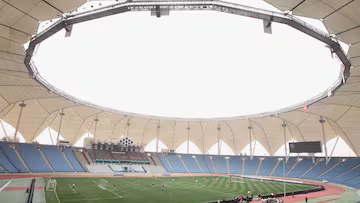Why is the Spanish Super Cup 2023 played in Saudi Arabia?
In recent editions we’ve watched the previous year’s top teams in Spain battle it out for another piece of silverware away from their own shores. But why?


The Spanish Super Cup is being played once again in Saudi Arabia, with Real Madrid to take on Barcelona in a cup final Clásico. After its time held, incredibly, in Spain, a sponsorship deal between the Saudi Arabian Football Federation and the Royal Spanish Football Federation was sealed, handing the country the rights to host the ‘domestic’ cup tournament for the coming years. That agreement was made in 2021.
🏆 The Spanish Super Cup bracket pic.twitter.com/eX7eWkNqMa
— FC Barcelona (@FCBarcelona) January 11, 2023
The ‘Saudi’ Spanish Super Cup
Now, clearly, cynical traditionalists will argue that this is simply a question of money talking. And, well, few would disagree. It’s not like the RFEF were looking to spread football across the world -- if they, like FIFA, were aiming for this, why is it that the mega-wealthy nations are the ones chosen? That’s rhetorical.
You may also like:
- Real Madrid possible starting lineup vs Barcelona in the Spanish Super Cup 2023 final
- Barcelona possible starting lineup vs Real Madrid in the Spanish Super Cup 2023 final
- How many times has Real Madrid won the Spanish Super Cup?
- How many times has Barcelona won the Spanish Super Cup?
Anyway, we are where we are, and the 2023 January edition has seen holders Real Madrid, Valencia, Barcelona and Real Betis face off in a mini-tournament, another new feature with dollar signs in the planning, for the annual title. The fact that Madrid and Barça have reached the final -via penalty shootouts, it should be said - has cynics also suggesting the powers-that-be are rubbing their hands with glee and have dollar signs in their eyes. My colleague Roddy has you covered if you’re looking for more info on this year’s edition, where all the games are on at the King Fahd Stadium in Riyadh.
Back to the why. The deal was reportedly worth $120 million and takes us through until 2029. Criticism came from many, including, for example, Amnesty International who were scathing of the federation’s “collaboration in this ‘whitewashing’ of the image of the Saudi Arabia”, where it said there had been very little improvement in the “the systematic abuse of homosexuals and continued discrimination against women.”
Why indeed is it there. A deal that was actually EXTENDED last year. Shame on the RFEF. It’s our one competition I refuse to watch.
— John Norris (@Jonnynono) January 10, 2023
https://t.co/awOX93j8YW
Related stories
For the Saudi’s the tournament is also being used as a means to promote the country as a destination for tourism and international events, but even LaLiga President Javier Tebas was unhappy, “not only for human rights” but also because “they’ve been pirating Spanish and European football for two years through a paid television backed by the Saudi Arabian government.”
One hope is that the multiple calls for the world of football to exert pressure on Saudi Arabia to improve its human rights record and to use the event as a means of raising awareness of these issues pays dividends. Unfortunately, as with the World Cup in Qatar, most people believe the rewards will come in a very different form, and not for those on the wrong end of the abuses.

